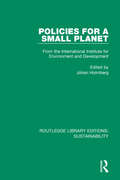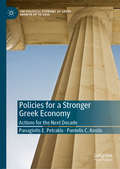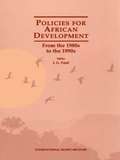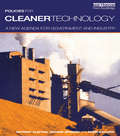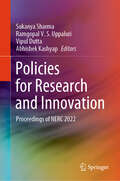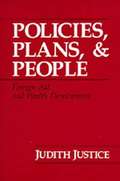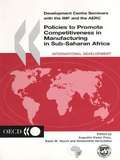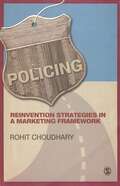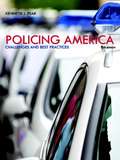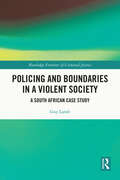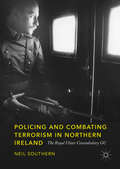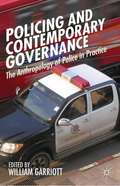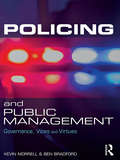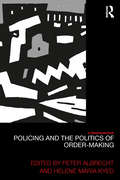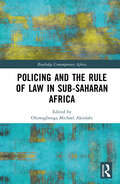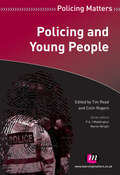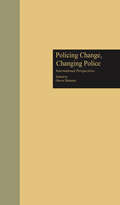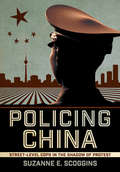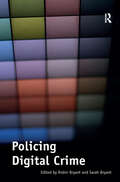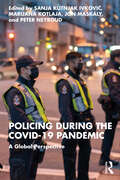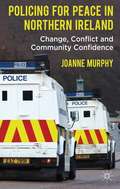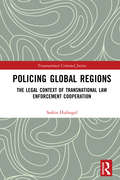- Table View
- List View
Policies for a Small Planet: From the International Institute for Environment and Development (Routledge Library Editions: Sustainability #4)
by Johan HolmbergFirst published in 1992. The world is not living within its means. Current development policies, in both industrial and developing countries, are wasting resources and destroying the commons on which we all depend. The world is set on a path of deepening poverty and a deteriorating environment. New policies are needed to achieve sustainable development. This book presents an integrated series of essays on the policies for sustainable development from one of the leading policy research institutes on environment and development issues. It concentrates on the developing world and looks at the specific sectors to which the policies have to be applied. Beginning with a discussion of what constitutes sustainable development, it goes on to deal with the institutional arrangements needed to mobilise human resources for change and the economic policies for sustainable natural resource management. It then examines the policies needed in agriculture, urban development, industry, forests, drylands, energy use, finance, population and consumption. Throughout it demonstrates how those directly involved are best placed to manage their environments and resources. Policies must support the experience and resourcefulness of local people. Sustainable development requires that they control their own futures. This title will be of great interest to students of Environmental Studies.
Policies for a Stronger Greek Economy: Actions for the Next Decade (The Political Economy of Greek Growth up to 2030)
by Panagiotis E. Petrakis Pantelis C. KostisThis book presents a comprehensive economic plan for Greece to encourage growth and avoid future crises. This book emphasizes structural reforms and the rational financial management and analysis of private and investment infrastructures. This book also looks at the country's production and places an emphasis on revitalizing its technological structure. The analysis in this book includes policy implementation (in the short-, medium- and long-term) across important topics such as sustainability, inclusivity, pro-growth social behavior, and dynamic economic growth. This book takes an evolutionary economics perspective, looking at important structures throughout society like governance, political functioning, cultural attitudes, and growth. With its comprehensive approach, this book is crucial reading for scholars and policymakers interested in the Greek economy.
Policies for Cleaner Technology: A New Agenda for Government and Industry
by Tony Clayton Graham Spinardi Robin WilliamsClean technology does not just aim to dilute or detoxify industrial waste. It aims to eliminate it by re-engineering the entire production cycle. As industry is constrained by regulations on the one hand and consumer pressure on the other, energy-efficient, resource-efficient and pollution-free production becomes imperative. It will be the next stage of industrial development. Using extensive empirical analysis of a range of different industrial sectors, this book shows how cleaner technology can be implemented, above all by the companies themselves. It looks at regulatory initiatives and focuses on how firms themselves can introduce the new technologies, systems and polices required.
Policies for Developing Forward Foreign Exchange Markets
by J. Quirk Graham Hacche Viktor Schoofs Lothar WenigerA report from the International Monetary Fund.
Policies for Research and Innovation: Proceedings of NERC 2022
by Sukanya Sharma Ramgopal V. S. Uppaluri Vipul Dutta Abhishek KashyapThe book aims to incorporate key findings pertaining to Northeastern India. The papers selected will highlight policies that are critical for fostering research and innovation in critical areas of scientific, social sciences, humanities and associated research paradigms relevant for the North-east.
Policies, Plans, and People: Foreign Aid and Health Development
by Judith JusticeJudith Justice uses an interdisciplinary approach to show how anthropologists and planners can combine their expertise to make health care programs culturally compatible with the populations they serve.
Policies to Promote Competitiveness in Manufacturing in Sub-Saharan Africa
by Augustin Kwasi Fosu Saleh M. Nsouli Aristomène VaroudakisPrimary commodities dominate African exports, yet these products are extremely vulnerable to variations in weather conditions, world demand and prices. If the continent is to obtain optimum benefit from the integration and opening of the world . . .
Policing: Reinvention Strategies in a Marketing Framework
by Rohit ChoudharyA first-of-its-kind, this book proposes a marketing plan for the police, using the conventional framework of marketing management. While there is considerable discussion and criticism of the way the police force functions in India, no comprehensive alternative model has been proposed to implement the New Police Management (NPM) approach in the force′s operations. In fact, the necessity for overhauling the police system is strongly felt all over the world in the light of the recent international security lapses. The framework that this book suggests comprises current situation analysis, SWOT analysis, STP analysis and the 8 Ps. Policing: Reinvention Strategies in a Marketing Framework combines marketing principles with the empirical knowledge of police operations to suggest improvements in the Indian police force. It uses the marketing motto of ′keeping the customer at the centre′ as key to finding solutions to the issues that the police face in their everyday operations. In addition, it carries case studies related to police operations from across the world and suggests ways of adapting the strategies used in these to the Indian context. In doing so, the book offers valuable inputs for police academies, public administration, public policy, and state security commissions, as it not only analyses the current situation in the police force, but also draws a clear and practicable roadmap to revamp it.
Policing America: Challenges and Best Practices (Eighth Edition)
by Kenneth J. PeakPolicing America: Challenges and Best Practices, 8e, offers a problem-solving approach that emphasizes what is actually working in the field. Based on the author’s thirty-plus years of practical policing and academic experience, this eighth edition continues to be set apart by its traditional, applied, “what works” theme. That, coupled with comprehensive updates throughout and the minor restructuring of this edition, provide an approach not otherwise found on the market. Emphases are on topics of major, national importance and interest, such as terrorism, personnel issues, community policing, investigations, rule of law, accountability (ethics, liability), patrol, and technologies. Organized to flow smoothly for the instructor and student, this edition continues to provide a penetrating view of one of the most difficult and challenging occupations in America: policing!
Policing and Boundaries in a Violent Society: A South African Case Study (Routledge Frontiers of Criminal Justice)
by Guy LambThis book explores how social and territorial boundaries have influenced the approaches and practices of the South Africa Police Service (SAPS). By means of a historical analysis of South Africa, this book introduces a new concept, ‘police frontierism’, which illuminates the nature of the relationships between the police, policing and boundaries, and can potentially be used for future case study research. Drawing on a wealth of research, this book examines how social and territorial boundaries strongly influenced police practices and behaviour in South Africa, and how social delineations amplify and distort existing police prejudices against those communities on the other side of the boundary. Focusing on cases of high-density police operations, public-order policing and the recent policing of the COVID-19 lockdown, this book argues that poor economic conditions combined with an increased militarisation of the SAPS and a decline in public trust in the police will result in boundaries continuing to fundamentally inform police work in South Africa. This book will be of interest to scholars and students interested in policing in post-colonial societies characterised by high levels of violence, as well as police work and police militarization.
Policing and Combating Terrorism in Northern Ireland: The Royal Ulster Constabulary Gc
by Neil SouthernThis book explores the challenges of combating terrorism from a policing perspective using the example of the Royal Ulster Constabulary GC (RUC) in Northern Ireland. The RUC was in the frontline of counter-terrorism work for thirty years of conflict during which time it also provided a normal policing service to the public. However, combating a protracted and vicious terrorist campaign exacted a heaving price on the force. Importantly, the book addresses a seriously under-researched theme in terrorism studies, namely, the impact of terrorism on members of the security forces. Accordingly, the book examines how officers have been affected by the conflict as terrorists adopted a strategy which targeted them both on and off duty. This resulted in a high percentage of officers being killed whilst off duty - sometimes in the company of their wives and children. The experience of officers' wives is also documented thus highlighting the familial impact of terrorism. Generally speaking, the victims of terrorist attacks have received scant scholarly attention which has resulted in victims' experiences being little understood. This piece of work casts a specific and unique light on the nature of victimhood as it has been experienced by members of this branch of the security forces in Northern Ireland.
Policing and Contemporary Governance
by William GarriottWhat is it that police and policing actually do? What are the effects? How are these effects mediated and experienced by different people at different times and in different contexts? This volume draws attention to the centrality of police and policing to the project of governance and the experience of being human in the contemporary world.
Policing and Public Management: Governance, Vices and Virtues
by Kevin Morrell Ben BradfordPolicing and Public Management takes a new perspective on the challenges and problems facing the governance of police forces across the UK and the developed world. Complementing existing texts in criminology and police studies, Morrell and Bradford draw on ideas from the neighbouring fields of public management and virtue ethics to open the field up to a broader audience. This forms the basis for an imaginative reframing of policing as something that either enhances or diminishes "the public good" in society. The text focuses on two cross-cutting aspects of the relationship between the police and the public: public confidence and public order. Extending award-winning work in public management, and drawing on extensive and varied data sources, Policing and Public Management offers new ways of seeing the police and of understanding police governance. This text will be valuable supplementary reading for students of public management, policing and criminology, as well as others who want to be better informed about contemporary policing.
Policing and Security in Practice
by Tim PrenzlerModern policing is a vital institution for the defence of political and civil rights and for the protection of citizens from crime and fear of crime. Private security agents are also playing an increasingly important role in crime prevention and order maintenance, and also in protecting government assets and services. At the same time, crime and disorder remain major problems in contemporary societies, and there are ongoing issues of integrity and competency in many police departments and in the security industry. Policing and Security in Practice: Challenges and Achievements addresses questions of 'best practice' across police and security work by focusing on what the scientific literature says about how to achieve optimal outcomes in law enforcement, crime prevention and professional standards. Each chapter is written by subject experts with many years of research experience and of collaborative work with policing and security agencies. The book is a highly readable, inspiring and fully grounded guide to achieving the best in policing and security.
Policing and the Politics of Order-Making (Law, Development and Globalization)
by Peter Albrecht Helene Maria KyedThis anthology explores the political nature of making order through policing activities in densely populated spaces across Africa, Asia and Latin America. Based on ethnographic research, the chapters analyze this complex with respect to marginalized young men in Haiti, community policing members and national politicians in Swaziland as well as other individual and collective actors engaged in policing and politics in Indonesia, Swaziland, Ghana, South Africa, Mexico, Bolivia, Haiti and Sierra Leone. What these contexts have in common is a plurality of order-making practices. Not one institution monopolizes the means of violence or a de facto sovereign position to do so. A number of interests are played out simultaneously, entailing re-negotiations over the very definition of what ‘order’ is. How and by whom a particular order is enforced is contested, at times violently so, and is therefore inherently political. In the existing literature on weak states, legal pluralism and policing in the Global South it is seldom made explicit that making order is a route to power and positions of political decision-making. It is this gap in the literature that this anthology fills, as it analyses the politics at stake in processes of order-making.
Policing and the Rule of Law in Sub-Saharan Africa (Routledge Contemporary Africa)
by Oluwagbenga Michael AkinlabiThis book argues that strengthening policing, and the rule of law is pivotal to promoting human rights, equity, access to justice and accountability in sub-Saharan Africa. Through a multidisciplinary approach, this book considers the principles of accountability, just laws, open government, and accessible and impartial dispute resolution, in relation to key institutions that deliver and promote the rule of law in selected countries in sub-Saharan Africa. Chapters examine a range of topics including police abuse of power and the use of force, police-citizen relations, judicial corruption, human rights abuse, brutality in the hands of armed forces, and combating arms proliferation. Drawing upon key institutions that deliver and promote the rule of law in sub-Saharan African countries including, Botswana, Ghana, Kenya, Madagascar, Nigeria, Rwanda, and South Africa, the contributors argue that strengthening policing, security and the rule of law is pivotal to promoting human rights, equity, access to justice and accountability. As scholars from this geographical region, the contributing authors present current realities and first-hand accounts of the challenges in this context. This book will be of interest to scholars of African studies, criminology and criminal justice, police studies, international law practice, transitional justice, international development, and political science.
Policing and Young People (Policing Matters Series)
by P A J Waddington Martin Wright Tim Read Colin RogersAn accessible and up to date introduction to the key theme of policing and young people. This text gives a comprehensive overview of the issues involved in working with young people as offenders, suspects, witnesses, victims and citizens. It looks at perceptions of the young, and the role of the media in the context of current debates around anti-social behaviour, gangs and the family. The impact of multi-agency approaches on the way that young people are dealt with by the police and other agencies is considered, and additional chapters discuss police discretion and ethics, and safeguarding vulnerable young people.
Policing Change, Changing Police: International Perspectives (Current Issues in Criminal Justice #Vol. 14)
by Otwin MareninFirst published in 1996. In keeping with the other volumes in the Current Issues in Criminal justice series, this anthology is a prime example of joining readability and scholarship. Editor Otwin Marenin has thoughtfully commissioned and compiled an excellent group of essays on the role of police in changing societies by a very knowledgeable group of scholars. Moreover, Marenin has added substantially to the collection through his own insightful contributions.
Policing China: Street-Level Cops in the Shadow of Protest (Studies of the Weatherhead East Asian Institute, Columbia University)
by Suzanne E. ScogginsIn Policing China, Suzanne E. Scoggins delves into the paradox of China's self-projection of a strong security state while having a weak police bureaucracy. Assessing the problems of resources, enforcement, and oversight that beset the police, outside of cracking down on political protests, Scoggins finds that the central government and the Ministry of Public Security have prioritized "stability maintenance" (weiwen) to the detriment of nearly every aspect of policing. The result, she argues, is a hollowed out and ineffective police force that struggles to deal with everyday crime.Using interviews with police officers up and down the hierarchy, as well as station data, news reports, and social media postings, Scoggins probes the challenges faced by ground-level officers and their superiors at the Ministry of Public Security as they attempt to do their jobs in the face of funding limitations, reform challenges, and structural issues. Policing China concludes that despite the social control exerted by China's powerful bureaucracies, security failures at the street level have undermined Chinese citizens' trust in the legitimacy of the police and the capabilities of the state.
Policing Digital Crime
by Sarah Bryant Robin BryantBy its very nature digital crime may present a number of specific detection and investigative challenges. The use of steganography to hide child abuse images for example, can pose the kind of technical and legislative problems inconceivable just two decades ago. The volatile nature of much digital evidence can also pose problems, particularly in terms of the actions of the 'first officer on the scene'. There are also concerns over the depth of understanding that 'generic' police investigators may have concerning the possible value (or even existence) of digitally based evidence. Furthermore, although it is perhaps a cliché to claim that digital crime (and cybercrime in particular) respects no national boundaries, it is certainly the case that a significant proportion of investigations are likely to involve multinational cooperation, with all the complexities that follow from this. This groundbreaking volume offers a theoretical perspective on the policing of digital crime in the western world. Using numerous case-study examples to illustrate the theoretical material introduced this volume examine the organisational context for policing digital crime as well as crime prevention and detection. This work is a must-read for all academics, police practitioners and investigators working in the field of digital crime.
Policing Domestic Abuse: Risk, Policy, and Practice
by Katy Barrow-Grint Jacqueline Sebire Jackie Turton Ruth WeirThis book is dedicated to improving the practice of the policing of domestic abuse. Its objective is to help inform those working in policing about the dynamics of how domestic abuse occurs, how best to respond to and investigate it, and in the longer term how to prevent it. Divided into thematic areas, the book uses recent research findings to update some of the theoretical analysis and to highlight areas of good practice: &‘what works and why&’. An effective investigation and the prosecution of offenders are considered, as well as an evaluation of the success of current treatment options. Policing domestic abuse can only be dealt with through an effective partnership response. The responsibilities of each agency and the statutory processes in place when policy is not adhered to are outlined. Core content includes: A critique of definitions and theoretical approaches to domestic abuse, including coverage of the myths surrounding domestic abuse and their impact on policing. An exploration on the challenges of collecting data on domestic abuse, looking at police data and the role of health and victim support services. A critical review of different forms of abuse, different perpetrators and victims, and risk assessment tools used by the police. A critical examination of the law relating to domestic abuse; how police resources are deployed to respond to and manage it; and best practice in investigation, gathering evidence, and prosecution Key perspectives on preventing domestic abuse, protecting victims, and reducing harm. Written with the student and budding practitioner in mind, this book is filled with case studies, current research, reports, and media examples, as well as a variety of reflective questions and a glossary of key terms, to help shed light on the challenges of policing domestic violence and the links between academic research and best practice.
Policing during the COVID-19 Pandemic: A Global Perspective
by Sanja Kutnjak Ivković Marijana Kotlaja Jon Maskály Peter NeyroudProviding a global perspective on police adaptations to the COVID-19 pandemic, this book explores the extent of police organizational and operational changes in a number of countries as diverse as Brazil, China, South Africa, South Korea, the Philippines, Russia, the United Kingdom, and the United States. Bringing together a range of international experts, this book reflects on the changes in the broader social environment during the pandemic, examining the contours of police operational and organizational changes across several countries, analyzes the police enforcement of the government COVID-19 rules and regulations, explores the factors related to the COVID-19 effects on police officer wellness and safety, and studies police administrator, police officer, and citizen views about the potential consequences of organizational and operational changes on the interpersonal relations within police agencies and police–community partnerships. Policing During the COVID-19 Pandemic is essential reading for scholars and practitioners interested in exploring the police organizational adaptations, particularly in the times of emergencies, and the societal, cultural, and legal impacts of such adaptations. Sanja Kutnjak Ivković is Professor at the School of Criminal Justice, Michigan State University, USA. She is the Co-Editor of Policing: An International Journal. She is past Chair of the Division of International Criminology, American Society of Criminology, and past Chair of the International Division, Academy of Criminal Justice Sciences. Her co-authored and co-edited books on policing include: Exploring Contemporary Police Challenges, Police Code of Silence in the Times of Change, Police Integrity in South Africa, Exploring Police Integrity, Police Integrity across the World, Enhancing Police Integrity, Fallen Blue Knights, and The Contours of Police Integrity. Marijana Kotlaja is Assistant Professor in the Department of Criminal Justice and Criminology at the University of Missouri-Kansas City, USA. She is involved in evaluation research projects with many organizations, specifically focused on crime and place, and juvenile delinquency. She has led multiple international data collection efforts and has extensive knowledge of advanced quantitative methodology, including structural equation modeling, Bayesian analysis, and hierarchical linear models. She is the Secretary/Treasurer of the Division of International Criminology (American Society of Criminology), as well as the Editor of Around the Globe for the Criminologist. Jon Maskály is Assistant Professor in the Department of Criminal Justice at the University of North Dakota, USA. He won (with co-authors) the 2016 William L. Simon Outstanding Paper award from the Academy of Criminal Justice Sciences. His primary research interests revolve around issues in policing, notably police–community relations, police integrity, and police accountability. He has worked as a subject matter expert in several police reform projects around the nation. He has secured multiple contracts with police organizations to enhance their ability to make data-driven decisions. Peter Neyroud is Associate Professor in Evidence-Based Policing in the Jerry Lee Centre for Experimental Criminology, University of Cambridge, UK. He is the General Editor of the Oxford Journal Policing: A Journal of Policy and Practice. He set up and ran the UK National Policing Improvement Agency. He was commissioned by the UK Home Secretary to carry out a fundamental “Review of Police Leadership and Training,” which led to the establishment of the National “College of Policing.” He is the Co-Chair of the Campbell Collaboration Crime and Justice Coordinating Group.
Policing for Peace in Northern Ireland
by Joanne MurphyThis is the first in-depth analysis of the transition from the RUC to the PSNI seen through the eyes of key figures, inside and outside the organization. It provides a fresh insight into the wider social and political context in which this change occurred and is a significant contribution to the story of the Northern Ireland peace process.
Policing Global Regions: The Legal Context of Transnational Law Enforcement Cooperation (Transnational Criminal Justice)
by Saskia Maria HufnagelThis book provides a stocktake and comparative socio-legal analysis of law enforcement cooperation strategies in four different regions of the world: the European Union (EU), North America, Greater China and Australasia. The work analyses law enforcement cooperation mechanisms within the socio-legal framework of global normmaking. The strategies addressed range from legal frameworks facilitating cooperation to formal and informal police networks and cooperation practices. The study also takes into account crime-specific engagement, for example campaigns focusing on drug crimes, terrorism, financial crime, kidnappings and other offences. It explores challenges in policing practice and human rights protection in each region that could be countered by existing strategies in another. As regions usually develop more advanced cooperation mechanisms than exist at a global scale, strategies found in the former could help find solutions for the latter. To map existing strategies and assess their impact on both human rights and policing practice this study relies on an assessment of the primary and secondary literature sources in each region as well as interviews with practitioners ranging from senior police officers to prosecutors, government officials, customs and military staff. This book presents a valuable resource for academics and postgraduate students, as well as policing and criminal justice practitioners, government officials and policy makers.
